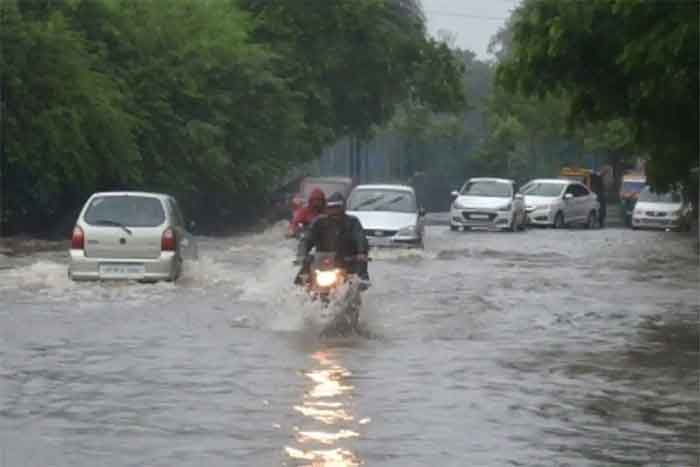
It’s a beautiful new beginning on the day of Rakhi across some villages and small towns in several districts of Bengal. Resurrecting a tradition started by Rabindranath Tagore, volunteers of the Bangla Sanskriti Manch have organized intimate get-togethers with locals. Everyone is tying rakhi on everyone’s hands, and there is a smile on every face. Here, it is a festival of shared bonding, peace and harmony.
Men tying rakhi on the hands of men, women on women, men on women, elders on children’s hands, across the class and religious spectrum. Muslims, Christians, Hindus, Dalits, Adivasis, among others — they have all joined in this ‘unity in diversity’ moment of restoring the faith of local communities in a secular and shared society.
“We are reaffirming the values which Tagore taught us,” said a woman at a local function. “All who live here are united by this thread of love and friendship. We celebrate this every year, and we want to send a message through this symbolic act that we will not allow divisive, communal and sectarian forces to succeed in Bengal.”
The pre and post-Covid era in contemporary Bengal has resurrected several civil society groups who have pushed the threshold in crafting a new secular and progressive discourse, while reaching out to people in crisis and resurrecting old-fashioned values of human compassion, shared spaces, and idealism. Among such groups, the sustained and committed grassroots endevour of the Bangla Sanskriti Manch has been remarkable.
Clearly, they stand out in terms of their vast reach and relentless work at ground zero, creating a scaffolding in the most difficult and remote terrain in several districts of West Bengal, especially among those in the margins: Adivasis, Dalits, poor Muslims and other economically weak communities.
“We have no political agenda,” says a tireless Samirul Islam, 32, Assistant Professor of Chemistry in a college in Howrah, affiliated with the Calcutta University, and an alumni of IIT, Delhi. As president of this young organization of 60,000 thousand followers and hundreds of committed volunteers and activists across West Bengal, he is clear-headed, passionate, modest and focused.
 “We are here to resurrect and restore the finest values of democracy, justice and secularism, and the great cultural and intellectual heritage of Bengal. We will not allow fascist forces to destroy the progressive fabric of the state. We also think that it is our responsibility to reach out to ordinary people, especially the poorest, who need social intervention, who are voiceless and in crisis, and who are inevitably left out by mainstream society. When necessary, we knock at the doors of the administration and the government to do things, which they must – like fix broken roads. Our work since the last five years proves that,” he said
“We are here to resurrect and restore the finest values of democracy, justice and secularism, and the great cultural and intellectual heritage of Bengal. We will not allow fascist forces to destroy the progressive fabric of the state. We also think that it is our responsibility to reach out to ordinary people, especially the poorest, who need social intervention, who are voiceless and in crisis, and who are inevitably left out by mainstream society. When necessary, we knock at the doors of the administration and the government to do things, which they must – like fix broken roads. Our work since the last five years proves that,” he said
Founded in 2017 after the ‘riots’ of Dhulagarh in Howrah district, where they played a crucial role in healing wounds and restoring sanity, the Bangla Sanskriti Manch has evolved into a rainbow coalition which has been working for multiple causes: solidarity actions in rural Bengal in support of the farmers’ struggle at the Delhi border, secular and cultural mobilization against hate politics, mass action against the NRC/CAA, and reaching out immediately after the Cyclone Amphan when they provided relief, food, shelter and medicine across the ravaged landscape of the Sunderbans.
However, most outstanding has been their extraordinary work during the pandemic, since the first draconian and sudden lockdown was declared by the prime minister on March 24, 2020. The Manch is very active in the districts of Birbhum, Murshidabad, Malda and North and South 24 Paragana, and in Howrah and Hoogly next to Kolkata.
Samirul says that during the first phase of the pandemic what was glaring was the universal lack of sanitisers. “People in small towns and villages had zero access to sanitisers. The bottles were being sold in black market at huge rates even in urban areas. That is when we decided to do something. We were finally able to make 30,000 sanitisers of high quality and distributed it to frontline workers: traffic cops, policemen on duty, bus drivers and conductors, street vendors and hawkers, and health workers, among others.”
Soon after, the massive migrant workers’ crisis began across the country, when tens of thousands of people began walking on the highways, often barefoot, men, women and children, with their sacks and meager belongs, hungry, thirsty and helpless. They were escaping mass unemployment, abject poverty, the deathly pandemic, and the cruelty of the city, trying to reach ‘home’ after miles of trekking, even while the central government washed its hands off all responsibility.
The Manch created several effective and efficient ‘helplines’, equipped with computers, volunteers and connectivity, in 10 districts almost immediately. They were trying to connect with around 75,000 migrant workers from Bengal stranded in other parts of the country, from Kerala and Hyderabad, to Punjab and Jharkhand. Not surprisingly, thousands of workers and their relatives and friends reached out to the helplines – and they were soon after provided basic amenities, food, transport, shelter, medicines, counseling.
Most migrant workers from Bengal are landless labourers. They belong to the SC/ST and minority community, and economically marginalized backward castes, among others. They are largely employed in the construction industry as unorganized labour and skilled ‘raj mistri’, while others work in the jewellery business and clothes factories. Even while the workers were not able to move out due to the lockdown, the Manch activated a huge network of voluntary and other civil society groups across India, and reached out to around 60,000 workers. Dry ration was distributed to thousands of workers who were stranded outside Bengal.
In Bengal, community kitchens were organized for those who were returning and those who were rendered jobless due to the lockdown. These community kitchens across Bengal are still running. They give simple and nourishing food.
In the second phase, volunteers were taken by surprise by the virulent form the killer virus had acquired across the country, amidst mass cremations, and lack of oxygen and beds. People were being cremated in public parks and streets in some cities in North India, and cremation and burial grounds were choking with dead bodies, though the situation was not so abysmally bad in West Bengal.
“One of the first problems we identified was that no one was picking up dead bodies. People were scared. Loved ones and relatives were not ready to pick up dead bodies, ambulances were absent or not available, and funerals became a daily tragedy. That is when we entered and started picking up dead bodies for cremation and burial, organized and paid funeral expenses, and helped broken families in as many ways as we could,” said Samirul.
After that, they were organizing oxygens, hospital beds, ambulances, food, medicine. Some doctors and health workers pitched in with solidarity actions. In remote Adivasi areas of Birbhum, for instance, families had no access to basic medical care. Not even food. The volunteers of the Bangla Sanskriti Manch, alerted by their vast network in the interiors, would immediately reach out and provide a solution, as in Huchukpahri in Birbhum district. In many of these Adivasi areas the only source of survival has been making and selling ‘thongas’ (bags) made with sal leaves, which largely left the people in a perpetual state of poverty and malnourishment.
After witnessing their relentless work amid this huge crisis in the most inaccessible areas, Rajya Sabha MP, Dola Sen of Trinamool Congress, helped organize an ambulance for the Manch. Others too pitched in with various kinds of support.
“Our work continues each day, often outside the limelight. We will expand our network to more remote areas. Volunteers are joining us and thousands are actively involved, especially in remote areas, for instance, among the Adivasis of Birbhum. The main thing is that we are not connected with any political or corporate organisation. We are not funded by any big organization. We are sustaining our work with the help of people pitching in with their efforts, labour, and resources. Perhaps, that is why we have certain credibility, and we are more effective, meaningful and connected to the reality on the ground,” said Samirul Islam.
True to its name the organization has also taken up issues of cultural relevance to the state. In January this year when the famous pous mela in Santiniketan was cancelled by the current vice-chancellor. The Bangla Sanskriti Manch organized a parallel event with artists, crafts persons, intellectuals and locals to preserve the tradition which was cherished and nourished by Tagore. The alternative mela was welcomed by many local residents and seen as a snub to the vice-chancellor, who was appointed by the regime in Delhi and is known to be a BJP loyalist.
Amit Sengupta is Executive Editor, Hardnews and a columnist, currently based in Kolkata














































